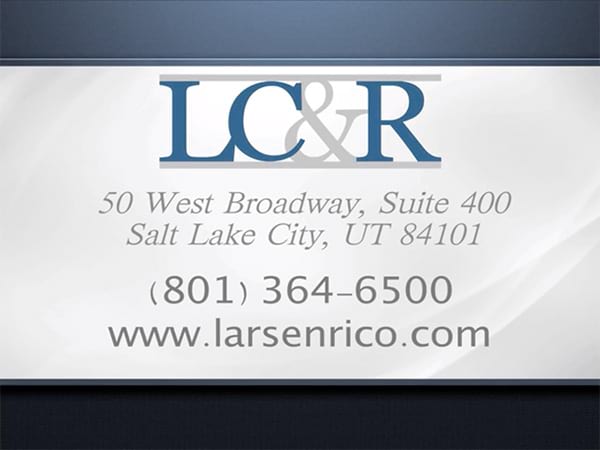The Economic Loss Rule: The Demarcation Line between Contract and Tort
Under Utah law, where the parties have entered into a contract, the economic loss rule may bar tort claims. See, e.g., Davencourt at Pilgrims Landing Homeowners Ass’n v. Davencourt at Pilgrims Landing, LC, 2009 UT 65, ¶ 18, 221 P.3d 234; Moliere v. Option One Mortgage Corp., 2011 WL 5403475 (D. Utah, Nov. 4, 2011). In complex business transactions, parties to the transaction identify risks, box them inside of certain restraints, and either assign those risks to one of the parties, or insure against the risk. This negotiating process may result in a party accepting a risk in exchange for an increase in price. For example, in the case of goods, the parties may agree on a warranty against defects in the materials or workmanship. A two-year warranty may cost less than a five-year warranty, but the anticipated cost of repairing or replacing a product generally can be actuarially calculated.
Tort laws impose legal obligations upon both strangers and acquaintances. Tort laws also may impose obligations where the recovery is for purely economic losses, such as fraud, misrepresentation and breach of fiduciary duties. On the other hand, contract law imposes duties upon contracting parties, or their intended beneficiaries, based upon promises contracting parties make to each other. Tort law may clash with contract law when the parties know each other and have negotiated the terms of their relationship in a contract. The question for the application of the economic loss doctrine – which bars tort claims — is whether the source of the imposed duty or obligations is tort or contract law.
For example, if the buyer agrees to a five-year warranty on the materials and workmanship of a product, when it fails in the sixth year, it is hard for the buyer to complain that the product was negligently manufactured (warranty) or the salesman told him it would last forever (integration clause) when the claim is for purely economic loss (the product failed, but did not personally injure anyone). On the other hand, regardless as to the terms of the contract, the federal Magnuson–Moss Warranty Act, 15 U.S.C. § 2301, et seq., could not be pre-empted by the economic loss rule. Whether the economic loss rule bars the buyer’s claim is factually dependent.
Perhaps the line between contract and tort was best stated in Reighard v. Yates, 2012 UT 45, 285 P.3d 1168:
A duty may arise from one of several sources. Duties may emanate from bargains, and therefore be within the ambit of contract law, and duties may also emanate from the “interdependent nature of human society,” in which case they are governed by tort principles.
The demarcation line between contract and tort is specifically addressed in Level 3 Communications, LLC v. Liebert Corp., 535 F.3d 1146 (10th Cir. 2008):
Explaining the demarcation between the two legal concepts in more detail, the Colorado Supreme Court has said, “[t]ort obligations generally arise from duties imposed by law … without regard to any agreement or contract.” Contract obligations, on the other hand, “arise from promises made between parties [to] allocate risks and costs during bargaining.” Demanding that an independent duty of care exist before a plaintiff can recover under tort law, the economic loss doctrine “serves to encourage parties to confidently allocate risks and costs during their bargaining without fear that unanticipated liability may arise in the future, effectively negating the parties’ efforts to build these cost considerations into the contract.” Absent an independent duty under tort law, the parties are held to the terms of their bargain.
Focusing upon communications that may form the basis for a negligent misrepresentation claim, the Court drew the distinction between communications the contract required, such as a misrepresentation made in fulfilling a specific duty under the contract, and conversations which occurred in the course of negotiating the contract, such as a communication which induces a party to enter a contract. The economic loss rule bars the former tort claim, but not the latter.
For the economic loss doctrine to apply, the contract must address the tort issue. The facts in Haynes Trane Service Agency, Inc. v. American Standard, Inc., 573 F.3d 947 (10th Cir. 2009) (en banc) (applying Colorado law), are illustrative. In that case, American Standard manufactured Trane heating and air conditioning systems (“HVAC”). Trane (American Standard) entered into a distributorship contract with HaynesTSA, the Denver distributer of Trane HVAC products. HaynesTSA forged customer invoices to defraud Trane under a claimback pricing policy Trane designed to keep Trane distributors’ bids competitive. This claimback program was developed after the parties signed the distributorship agreement and, in and of itself, was not a contract. The Court did not reach the issue of whether fraud was an exception to the economic loss doctrine because the distributorship agreements said nothing about the claimback policy. “Trane’s claimback policy is not contained in the contract between Trane and HaynesTSA but solely in the “Sales Plan[s]” that Trane provided its distributors to describe Trane’s practices regarding claimbacks.” Based upon the jury verdict, therefore, Trane prevailed on its fraud claim because the economic loss rule did not apply.
©2014 Mark A. Larsen, Jonathan O. Hafen, Michael A. Stahler, and Steven R. Glauser


